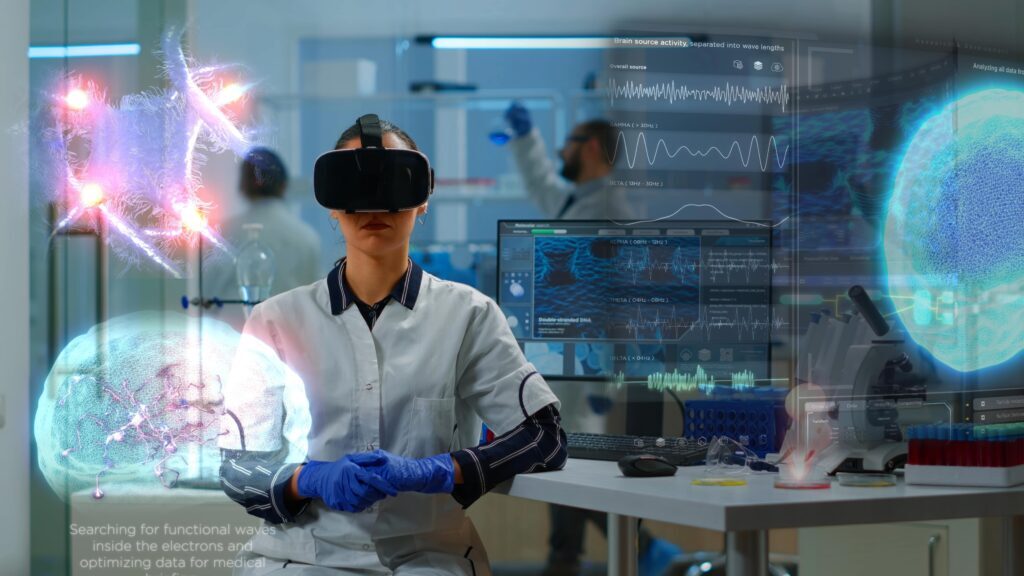WHO states that innovation, especially in the digital healthcare domain, is occurring on a scale never seen before. And this trend is felt across the world with consolidated healthcare systems and improved patient care outcomes – something that the industry continues achieving with collective efforts and technological transformations.
This seismic shift in the industry, propelled by groundbreaking innovations that are redefining the very fabric of how we approach health and wellness on a larger picture. From cutting-edge technologies to personalized and proactive care, the future of healthcare is being sculpted before our very eyes, promising a transformative journey towards better health outcomes and enhanced patient experiences.
This post highlights ten emerging healthcare technologies that have gained global attention.
Content Index:
- Generative AI
- Personalized Medicine
- Virtual Healthcare Assistants
- Digital Twins
- IoT-Powered Virtual Hospitals And Telemedicine 2.0
- Preventative Healthcare
- Virtual And Augmented Reality
- Elderly Care
- 3D Printing
- Convergence Of Mental And Physical Healthcare Delivery
Innovations That Are Revolutionizing Healthcare Industry

Generative AI
AI will be instrumental in many of the trends here, but generative AI, in particular, is particularly impactful in the healthcare industry.
Generative AI has gained rapid momentum, becoming a driving force in the industry’s shifting landscape. By democratizing access to other AI applications and unlocking the secrets of drug discovery and personalized treatment, this technology holds immense potential. With the ability to process large amounts of data and identify complex patterns, Generative AI is poised to speed up the development of critical therapies. Additionally, this technology can create data that can be used to train medical AI algorithms. It does this without putting patient privacy at risk. In short, Gen AI is set to revolutionize early detection and intervention strategies and solutions, backing healthcare professionals with unparalleled precision and accuracy.
Personalized Medicine
The field of personalized medicine is rapidly gaining global traction. Thanks to genomics and precision medicine advancements, healthcare professionals can now provide tailored treatments based on an individual’s unique genetic makeup. This approach enables healthcare providers to develop customized care plans and targeted solutions, which promise to maximize treatment effectiveness while minimizing adverse side effects. As a result, each patient can receive the most appropriate and effective care, with the potential to improve overall health outcomes. This paradigm shift represents a significant step forward in the industry, offering the possibility of more personalized and precise treatments that can ultimately benefit patients.
Virtual Healthcare Assistants
Revolutionizing healthcare by improving patient experiences has become a top priority. One of the ways this is being accomplished is through the use of virtual healthcare assistants. Imagine having access to an intelligent chatbot or virtual nurse who can help you with your healthcare concerns, schedule appointments, provide reminders for medication, and even offer valuable health education. These digital companions are leading the way in enhancing patient care by reducing the burden on healthcare providers and facilitating patients to take an active role in their well-being. With virtual healthcare assistants, and other innovations, available 24/7, patients can feel more confident and supported in their healthcare journey.
Digital Twins
Digital twins are virtual replicas of organs and patients that are helping to revolutionize medical research and treatment. This cutting-edge technology simulates real-world scenarios and allows healthcare professionals to test treatments on virtual models, providing invaluable insights without risking human lives – it is beneficial in treating complex medical conditions.It is capable of simulating anything from a single device, such as a needle, to an entire hospital, allowing for a better understanding of how services are delivered.
By leveraging digital twins, medical professionals and researchers can accelerate the development of personalized therapies and create more effective and safer treatment strategies. This breakthrough technology holds the key to unlocking new medical research frontiers and transforming how we approach healthcare.
IoT-Powered Virtual Hospitals And Telemedicine 2.0
Integrating the Internet of Things (IoT) into healthcare is bringing a new era of virtual hospitals and telemedicine 2.0. The use of remote patient monitoring and healthcare IoT devices is enabling real-time data collection and analysis, thereby transforming rural healthcare access and emergency response. With this technology, patients can receive high-quality care from their homes, while healthcare providers can monitor their conditions remotely, ensuring timely interventions and improved outcomes.
This futuristic technology has the potential to change the traditional healthcare system and make healthcare more accessible to people in remote and underserved areas. It could also revolutionize the way healthcare is delivered, making it more efficient and effective.
Preventative Healthcare
Preventative healthcare is another cornerstone of healthcare advancement, empowering patients to take an active approach toward their well-being. Thanks to wearable technology and personalized health tracking, individuals can now easily monitor their vital signs, activity levels, and overall health, thus fostering a culture of proactive wellness. The use of AI-driven risk assessment and early intervention strategies further improves our ability to identify and mitigate potential health concerns before they escalate, ultimately cutting down the burden on healthcare systems while improving overall population health. In summary, by embracing preventative healthcare, individuals take charge of their well-being, and healthcare systems benefit from reduced costs, improved care solutions, and better health outcomes.
Virtual And Augmented Reality
Advances in technology have greatly impacted the healthcare industry, particularly virtual and augmented reality. These cutting-edge technologies are being used to take medical training and surgical simulations to new heights, enabling healthcare providers to enhance their skills and increase their preparedness and competency. This has led to a higher level of patient care and safety.
Additionally, virtual and augmented reality are utilized to provide immersive experiences for patients, aiding their education and therapy. This is how patients are empowered to take a more active role in their care by better understanding their conditions and available healthcare solutions. In a nutshell, these technological advancements have greatly improved the healthcare industry and how patients and healthcare professionals interact.
Elderly Care
As our population ages, there is a growing need for compassionate elderly care. Fortunately, technology has stepped in with innovative solutions that enable seniors to live on their own while providing the necessary support and assistance they require. Robotic assistants and smart home technologies are two such examples that are helping to preserve the autonomy and dignity of our elderly population.
Telehealth solutions are being used to monitor and manage chronic diseases among the elderly remotely. This ensures that our aging population receives the medical attention they require, regardless of their physical location. This technology can provide better care for our elderly population, enabling them to live healthier and more fulfilling lives while lowering the burden on healthcare systems and caregivers.
3D Printing
3D printing technology facilitates the creation of implants, prosthetics, and surgical tools and opens up new possibilities in bioprinting and the regeneration of organs. Imagine a future where it’s possible to grow replacement organs from a patient’s cells. This prospect would make the need for organ donations obsolete and significantly reduce the risk of the body rejecting these new organs. By harnessing this healthcare technology, we stand on the brink of a new era where many lives could be saved, and the quality of life for many could be dramatically improved. The applications of 3D printing in the industry are immense, promising to reshape how we think about medical treatment and patient care.
Convergence Of Mental And Physical Healthcare Delivery
In the past, mental and physical health care have been treated as separate entities in medicine. However, the COVID-19 pandemic has brought about a shift in healthcare providers’ understanding of the intrinsic relationship between physical and mental well-being. This has led to an increasing recognition of the need for a holistic approach to healthcare.
In 2024, frontline healthcare providers, such as primary care physicians, are expected to adopt this approach. They will screen patients for mental health issues that may impact the treatment and recovery of physical ailments. This process will ensure that patients receive comprehensive care that considers the linkage of their physical and mental health.
As we stand on the precipice of this healthcare revolution, we must accept the change and harness the power of technology to achieve better health outcomes for all. From personalized medicine to virtual healthcare assistants and preventative care, these innovations are poised to reshape how we approach health and wellness.
The future of healthcare is unfolding before our eyes, and it promises a world where proactive, personalized, and technology-driven care is the norm. By harnessing the potential of these groundbreaking innovations, we can build a healthier, more robust, and empowered society, where the pursuit of well-being is a joint effort between healthcare providers, patients, and the cutting-edge technologies that support them.
Solving What’s Ahead
Investments addressing the disparities in healthcare access and outcomes are expected to increase in the coming years. This emphasizes the importance of providing equitable care to everyone, regardless of race, ethnicity, or gender. Efforts to reduce imbalances in healthcare delivery and costs will also likely be prioritized.
Moreover, there will be a growing emphasis on sustainability in healthcare, with a focus on reducing waste and energy use. This will involve the adoption of sustainable practices and technologies and the design of healthcare facilities to be more energy-efficient. These measures will help healthcare providers cut costs while also reducing their carbon footprint.














